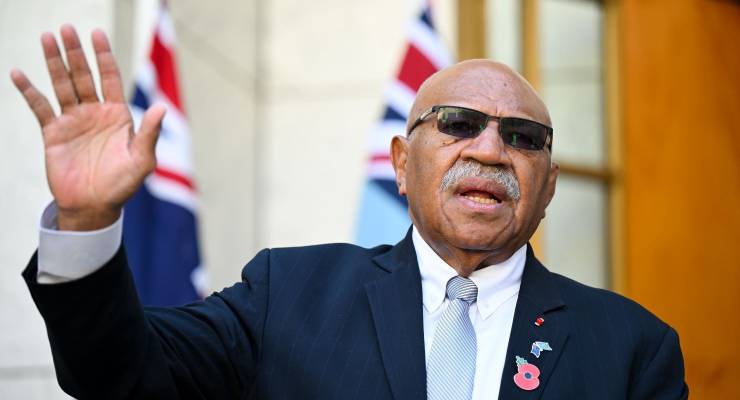
Fiji Prime Minister Sitiveni Rabuka has a dilemma: how does the leader of a tiny Pacific nation balance the competing interests of the two superpowers that straddle the ocean?
In a speech to the Lowy Institute think tank during his visit to Canberra this week, Rabuka said his country was being “drawn towards the two poles” of China and the US, but his wish was for peace and stability.
“Fiji’s position is clear. We are friendly with China and the US and do not want to be caught in the struggle between the superpowers,” he said. “Please maintain the peace.”
To that end, Rabuka will be pushing for a Pacific “peace zone” when the Pacific Islands Forum member nations — including Australia — meet in the Cook Islands in November.
“For us in the blue Pacific, history may be calling, it might be our manifest destiny to carry banners for peace and speak out for harmony in our time, and forever,” he said.
Griffith University associate professor Tess Newton Cain said China was an important economic partner of Fiji, but added Rabuka wishes to revisit certain aspects of the relationship.
“Rabuka has previously said he wants to revisit the security relationship, including the role of Chinese policing agencies in relation to Fiji police — now, we’re not completely sure where that’s at, it appears that arrangement is under review, and we don’t know when that will be concluded,” she told Crikey.
“But certainly since Rabuka came to power, that aspect of the relationship seems to have been dialled back quite significantly.”
Newton Cain, who is the project lead for Griffith’s Pacific Hub, said it’s important for Australia to take any opportunity to deepen its relationship with Fiji and other Pacific nations.
“Australia is part of what it has termed the Pacific family and so it really needs to be demonstrating that this is a strategic, deep, multifaceted relationship of partnership and trust, not a reaction to what someone else is doing,” she said.
When Rabuka met with Anthony Albanese on Wednesday, the Australian prime minister heaped praise on his counterpart.
“We are such very close friends,” Albanese said. “Both of us agree that Pacific unity is central to the relationship in our region. And Fiji plays a critical leadership role.”
Underscoring that alliance, Albanese and Rabuka updated the Fiji-Australia Vuvale Partnership, a framework of shared priorities aimed at strengthening peace in the Pacific.
Australia also agreed to sell Fiji 14 Bushmaster armoured vehicles that will be used for peacekeeping operations, and pledged $68 million in budget support for Fiji, while promising to streamline visa services for Fijian nationals wishing to visit Australia.
Newton Cain said the visa arrangement would be the most important outcome for Fiji: “I think that’s an interesting concession on the part of Australia — this is a real thorn in the side of the relationship. Whether it’s a sufficient concession we don’t know yet.”
When Foreign Minister Penny Wong visited Fiji’s capital Suva last month, she hailed Rabuka for supporting Australia’s bid to host the global climate conference COP31 in 2026. The idea is to co-host the UN conference with other Pacific nations. It would be a prestigious occasion for Australia, which has been seen as a global outlier on climate change action, one that has not made significant progress in cutting emissions and moving beyond fossil fuels.
“We’re very grateful to Prime Minister Rabuka and others for supporting our bid … I appreciate that, you know, it’s a contested spot and I appreciate that some countries in the Pacific have different views about this. What I’d say to them is we’re genuine in our reasons for seeking this,” Wong said.
Newton Cain said in Rabuka’s view, it wouldn’t be fair to oppose Australia’s COP31 bid because other previous host nations have also struggled to rein in emissions. Standing next to Albanese on Wednesday, Rabuka said: “We’re realistic about our demands.”
“He’s certainly said plenty of things that Australia will be pleased to hear, including his support for COP31, his support for AUKUS. In some ways that might put him at odds with other Pacific leaders, but it certainly means he’ll be warmly received in Canberra at the moment,” Newton Cain said.








Fiji (and we have family there) should moderately engage with China, as we all should. A moderate engagement of all of us, with us all, is sense, decency and might lead to more prosperity, enlightenment, comfort. USA wilful, triumphal, isolationist aggressive displays are ruinous to a better future. No one nation can get ahead unfairly for long. We all need co-prosperity, collaboration, consensus.
To be effective, a COP meeting need to be hosted by a nation with good track record of decarbonisation. The host can then lead all the subcommittees of collaborating nations, create public events where agreements and treaties are declared to the world, and berate laggard nations (such as Australia) for their procrastination and prevarication.
Rather than Australia, it would make more sense for Fiji to host COP31, with the help of China’s finances and China’s zero-carbon technology.
It seems to me that no country is doing well at decarbonisation which in turn suggests that every leader of a country is in the pockets of the fossil fuel people. It seems rediculous to me that we have a conference where every world leader is invited where the agenda is theoretically to decarbonise but the secret agenda of all the participants is to say encouraging things but make sure nothing constructive happens as per their instructions from “big fossil”.
The pushback from fossil fuels varies from country to country. For example, the AP 1000 reactor was designed and polished in the USA. However pushback has limited installation in that country to two – and even then with them encased in vast concrete jars, ostensibly to protect them from being blown up. Pushback has failed to stop the expansion in China, which has four AP 1000’s already generating electricity and six more being built. In the process of building them, China has developed an indigenous equivalent reactor, touted IP-free, for its growing export market.
Both countries outclass Australia’s preparations to decarbonise. Either of those two countries could host a COP meeting that would agree to create markets big enough to normalise the cost of converting to nuclear. Such a market could include all of the nations of the world, overwhelming the power of big fossil. That is, except fossil-addicted puppets, like Australia.
I’m not sure how a 1,117MWe single unit is going to fair in our system with an annually decreasing peak load. The loss of the single unit Millmerran power station in QLD (750MWe) already threatens system stability in that state.
I’m not aware of any economical nuclear plants of smaller capacity (say 300-500MWe) and SMRs remain a dream for a decade or two at least.
The other problem with nuclear plant is that they need to be run flat out 24/7 – they are not flexible like coal, gas, hydro or even renewable plant (the latter is flexible in loading but since their marginal cost of production is near zero, they are always dispatched to the maximum they can produce).
Technically, the giant 1 GW reactors like the AP 1000 offer reliable stability to the East Australian grid, which supplies an average demand of 23 GW. Politically, it is the smaller reactors such as Rolls-Royce’s 300 MW (or the AP 300 down build of the AP 1000) that would be feasible as the first replacements for our coal-dominated grid. Rolls-Royce has been making small reactors for the British Navy for years.
It is only the bean counters that keep nuclear generators going flat out. When installed in attack submarines, reactors are going stop-start all the time. Much as you say of renewables, the marginal cost of production of nuclear generators is near zero, so they are routinely dispatched at the maximum demand gap. Better than renewables, nuclear generators are excellent at load following, and can provide heat stores to level out intermittent production by neighbouring renewables.